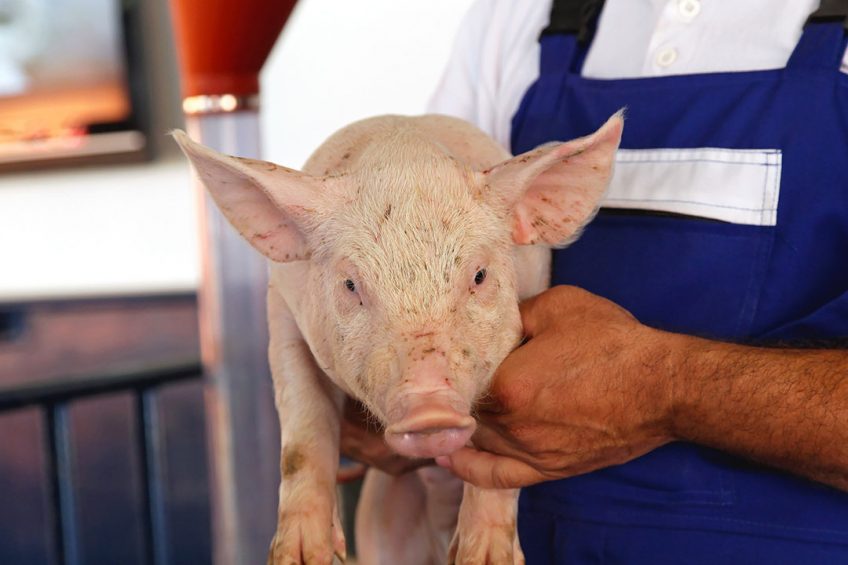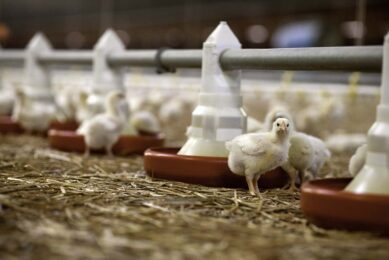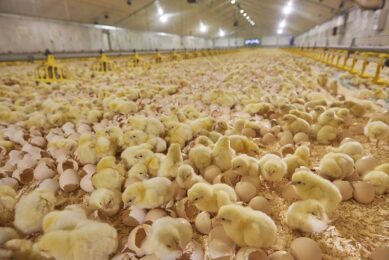Clear shift in traditional treatment of diseases

The use of antibiotics in livestock is under pressure. The issue of antibiotic resistance caused by misuse and over-use of antibiotics in livestock, is subject to scientific and regulatory discussion. Rob Kelly, president international operations at animal health company Zoetis, sees a clear shift in antibiotic use: “All around the world we see a change in thinking about, and the use of, antibiotics in livestock.”
With global experience of more than 20 years in the animal health industry, Rob Kelly shared his thoughts on innovation in livestock farming at the recent F&A Next event held at the Wageningen University & Research campus, the Netherlands. Animal health company Zoetis delivers medicines, vaccines and diagnostic products. With a revenue of USD$ 1.3 billion attributable to antibiotics for livestock, antibiotics are an important part of Zoetis’ total revenue of $ 5.8 billion.
According to the World Health Organization (WHO), ‘over-use and misuse of antibiotics in animals contributes to the rising threat of antibiotic resistance’. In 2017, the WHO therefore released guidelines to end giving antibiotics routinely to healthy animals. The European Union captured restrictions on the use of antibiotics in two veterinary medicine regulations, which were adopted in 2018. The sales of veterinary antibiotics in the EU have decreased by more than 20% between 2011 and 2016, according to a report published by the European Medicines Agency. The United States has banned antibiotics for the use of growth promotion in livestock, but still allows antibiotics to be given to healthy animals to prevent diseases.
More prevention vs treatment
Kelly sees that there is a major shift from treating diseases to preventing diseases. “There is a lot of innovation in this area,” he adds. Zoetis has anticipated this trend of preventing diseases instead of treating: a primary focus for Zoetis in 2018 was to increase the scale and market position in veterinary diagnostics. As a result, there was the acquisition of the company Abaxis, which develops instruments to detect diseases in animals. Also the acquisition of start-up SmartBow, which develops electronic ear tags for cows to detect signs of disease contributed to the renewed focus of Zoetis.

SmartBow is not the only start-up Zoetis collaborates with. “We acquired SmartBow in 2018 after a few years of partnership. With this acquisition we help to speed up and scale up the development of the technology. That’s the same with other start-ups we collaborate or partner with. These start-ups are drivers for innovation at Zoetis and the collaboration can help start-ups further in their development.” Kelly sees that the collaboration with start-ups is one of the multiple drivers for the existing R&D department within the company.
All around the world we see a change in thinking about, and the use of, antibiotics in livestock.” – Rob Kelly, president international operations at animal health company Zoetis.
As a result of the changing focus of Zoetis and also the market, the scope of the activities of Zoetis is becoming broader. From a company dealing mainly in vaccines and medicines to a company also with diagnostics for detecting diseases, genetic testing for prediction and services. “This does not mean that we think that antibiotics must not be used. We believe that veterinarians and farmers need the right tools to help their animals, with the condition that they use them responsibly,” Kelly adds. This is underlined in the company’s recent announcement regarding voluntarily withdrawing antibiotic use, see box.
Withdrawal of growth promotion antibiotic useZoetis is voluntarily withdrawing growth promotion indications from the labelling of medically important antibiotic products (as per US FDA classification) by June 2020. Upon completion of this exercise, the company will have made good its resolve for its medically important antibiotics products to be approved exclusively for therapeutic purposes. Rob Kelly, president international operations at animal health company Zoetis, sees a clear shift in antibiotic use: “All around the world we see a change in thinking about and the use of antibiotics in livestock. This does not mean that we think that antibiotics must not be used. We believe that veterinarians and farmers need the right tools to help their animals, with the condition that they use them responsibly.” Zoetis is taking this step as part of its commitment to join with its veterinarian and livestock farmer customers in helping to combat antimicrobial resistance, the company explained in a recent press release. The company remains committed to serving its customers with innovative products and services to predict disease with genetic tests, prevent disease with greater use of vaccines and teat sealants for dairy, diagnostics to detect disease and monitor health with point-of-care tools, and when disease occurs, to use antibiotics responsibly and properly with involvement of a veterinary professional as part of its continuum of care approach. The company concluded in the press release that it supports the responsible use of antibiotic medicines in animals and people. With few alternatives today for treating life- threatening bacterial infections in animals, antibiotics are essential to animal health and, in turn, to their welfare. Zoetis recognises that animal and human health are interdependent. It advocates a ‘One Health’ approach to the responsible use of antibiotics across human and veterinary medicine. The withdrawal of growth promotion indications is consistent with its dedication to this approach. |
In the coming years we will continue with innovation in pain management.” – Rob Kelly, president international operations at animal health company Zoetis.
Growth in developing markets
Another trend according to Kelly is the rapid growth of and in developing markets. Zoetis mainly sees opportunities in developing countries like Brazil and India. The company wants to do most of its future investments in these countries. “The middle-class in developing countries is growing fast, the population is growing fast and the Western trends are also reaching the developing countries. That means that attention paid to, for example, sustainability and food safety is increasing and becoming more global.” Another Western development that is moving to other countries is regulation, Kelly adds. “In the EU for example, we see a lot of regulation in animal health related subjects. There’s a lot of focus on product and user safety. Additionally, we see a lot of innovation protection. Also these topics are becoming more and more important in developing countries. Standards for animal health products are being developed and implemented at a high pace.”
Zoetis has to deal with a lot of developments that are often driven by public opinion, followed by political influences and regulations that farmers and veterinarians have to cope with. “These 3 pillars drive a lot of the innovation in animal health. However, I think we can dispute the difference people think there is between the 3 pillars. We all want good and safe food products and healthy animals. Our concerns and interests are not as far apart as we think. Keeping everybody happy is the thing you strive for.” A good example of something everybody wants is reducing pain, especially in cattle. “It is something that is not covered well enough yet. In the coming years we will continue with innovation in pain management. Another ongoing subject that will drive innovation is sustainability. We will need more food for more people, on the same amount of land, with fewer animals. That will keep us, and the whole livestock sector, busy in the coming years.”
Author: Carolien Kloosterman
Join 31,000+ subscribers
Subscribe to our newsletter to stay updated about all the need-to-know content in the poultry sector, three times a week. Beheer
Beheer






 WP Admin
WP Admin  Bewerk bericht
Bewerk bericht